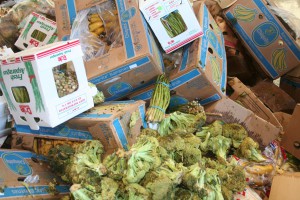The Minnesota Environmental Partnership is proud to feature the following post as part of a series of columns as part of a Student Voices Series issues. This is part of a continuing collaboration with Macalester College’s Geography Department and its students.
Almost every American produces waste. While most are aware that their trash is going into landfills or being burned, these have a significant impact on the environment‒making it important to reuse and recycle when possible. Food waste has not historically been a major concern. In 2015, the U.S. Department of Agriculture (USDA) and the Environmental Protection Agency (EPA) came up with the nation’s first food waste goal. Tom Vilsack, U.S. Secretary of Agriculture, told NPR that by 2030 he and the department have created a national goal to reduce food waste by 50 percent, which is estimated to be about 66.5 billion pounds of food. This means that every year, Americans are wasting a whopping 133 billion pounds‒the equivalent of 141 trillion calories‒of perfectly good food. This staggering statistic calls for immediate attention from the U.S. government and Americans.
Why should everyone care about food waste? There are many reasons. On an economic level, food waste means wasted money. It is a waste of money for food producers who cannot sell all of their food. It is a waste of money for grocery stores and restaurants that do not sell all of their food products. It is a waste of money for individual consumers who do not consume all of the food that they purchase. Money can be saved by decreasing agricultural production – the source of this problem – which is an incentive to the producers.
On a societal level, food waste means that food is not always going to those who need it. Feed America estimates that one in every seven Americans struggles to feed themselves every day, despite about 364 million pounds of food going to waste per day. Reducing food waste by diverting this “waste” food to those in need is one solution to the problem. Food waste also has a negative effect on the environment.
Unused food ends up in landfills with other trash, creating methane and fueling climate change. Additionally, water necessary in food production is being wasted on food that goes uneaten. It makes no sense for farmers in California to be wasting vast amounts of water on crops that will go to waste, especially when the state’s agriculture industry is going through a severe drought. There is also the issue of land use. In producing too much food, there is also a waste of land. Large scale agriculture has a negative effect on biodiversity, which is harmed when habitats are destroyed for agricultural use. By decreasing the amount of food produced, there will be physically more space for biodiversity and less waste of precious resources like water.
The EPA targets individuals in its campaign to reduce food waste by encouraging things such as composting, eating all edible parts of produce and “shopping” in your refrigerator before going to the grocery store. While this responsible consumer behavior is a good step towards reducing food waste on an individual level, it does not to solve the larger problem. The Department of Agriculture’s announcement means very little unless the U.S. government takes concrete action towards its goal to reduce food waste by 2030.
While Congress could create legislation aimed at increasing tax deductions for big food wasters – such as farmers – who donate excess food to people in need, it is the USDA that must take the lead in addressing the issue of food waste from the source: agricultural production. The Food Waste Reduction Alliance (FWRA), an organization that aims at reducing food waste and hunger, estimates that 25 to 40 percent of food grown and transported in the U.S. goes uneaten. The USDA needs to create policy aimed at reducing the amount of food that is grown in the U.S.
Reducing food waste will not only will be feeding hungry Americans and saving money, but decrease the waste that is burned and left to rot in landfills. Individuals should work to decrease their own food waste to save our environment. While this issue can be addressed by individuals, the most important changes will occur through government action. The U.S. government has a responsibility to its citizens to do its part in creating policy towards the 2030 goal, and the USDA should take the lead in creating policy to reduce food waste. Individuals should write to their congressmen and urge them to take concrete steps towards reducing national food waste. Until the source of this problem is taken care of, food waste will continue to harm our environment.
Helena Oddo is a senior at Macalester College, studying history and environmental studies.

It’s not only USDA’ s job. I think reducing food waste is a personal responsibility and mission for each one of us. If we only talk about this and then go home and throw our dinner away, because we are not hungry, what next? Though, it’s a great post and I’m definitely recommending it to my friends. Greets!